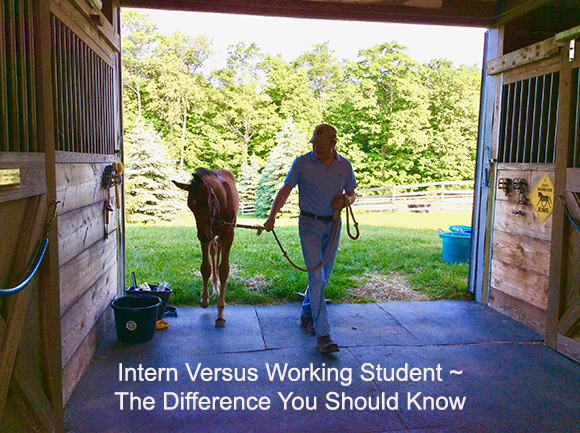Intern Versus Working Student ~ The Difference You Should Know
By Nikki Alvin-Smith

Like most trainers and barn owners I have often had a need for help managing the farm and training horses. I would place advertisements for job opportunities as both internships (paid and unpaid) and for working student positions. There is a keen difference between the two types of jobs and as an employer you should be aware of the legal repercussions of advertising or accepting applicants for either type and know what your obligations are under the law.
While I am not an attorney in labor law, I have taken counsel from someone that is and thought I’d pass along the information and experiences to you. As always, consult an attorney for professional consultation if you have questions.
The Difference
 You can offer internships as either paid or unpaid positions. At a minimum, basic expenses such as commuting expenses, meals etc. should be compensated or provided.
You can offer internships as either paid or unpaid positions. At a minimum, basic expenses such as commuting expenses, meals etc. should be compensated or provided.
An internship requires a planned program of training, which you should ideally lay out in writing. An internship also requires not just task setting but also constant supervision of the employee and feedback as to how they are meeting the demands you have set forth and advice and instruction on how they can improve their performance. The intern seeks a learning environment where you are sharing specific on the job training. This means you need to demonstrate to them exactly how you want a task completed and monitor their actions in completion of that task and provide feedback.
When you advertise your intern position you should detail specifics in the job that will be taught and never request such things as ‘ the ideal applicant will work productively without supervision,’ or ‘ the ideal applicant will work independently.’
Often interns will be working for a limited time while they acquire on the job training and will be returning to college classes once or even while they are employed by you. Be certain to have Worker’s Compensation, Disability Insurance and fulfill all insurance and payroll demands required by your State. Every State has different requirements so check in with your Department of Labor for details. Even unpaid internship positions require insurance, as technically interns qualify as employees.
The working student position on the other hand while also providing a ‘learning on the job program’, requires you to provide the same safe, professional environment for employment but does not necessarily require your constant supervision. The working student can be allowed to learn by doing without being shown how, with a fair assumption that they have already garnered the necessary experience to do the job without being shown every detail and that they will learn from you by osmosis and the occasional help you give them training wise along the way.
College Programs include internships and also on the job experience. The latter are paid and unpaid and the student simply attends your farm carrying out minor tasks and learning by watching how the business operates.
Be Fair With The Working Week
The best way to keep an employee of any sort is to treat them fairly. Like me you probably started out your equestrian career working for others, whether it was volunteering to work at the barn any spare moment you had in return for no promise of anything in return or working as a student.
It is particularly easy to abuse an employee by requiring them to work long hours every week to meet the demands of the horse business, which as we all know is not a nine to five job. Even if you are compensating them fairly financially for their efforts, a tired employee will make mistakes and they could be costly. As a business owner you are driven to have your business succeed and will choose to work extra hours and put in extra effort to attain that goal. You cannot expect that your employee should match your enthusiasm. Give them time off work, at least one day per week and have a clear schedule so they know what hours they are required to be present. This is especially important if they live on site. Just because they are on your farm does not mean they are at your beck and call whatever the hour.
You should also be aware that if you provide accommodation for your intern or working student, there is a dollar value to this ‘free’ living arrangement and it could be taxable/reportable income so consult your accountant.
Be Fair With Your Expectations
 Any student that comes into your yard is there to learn. Well. They are if you have selected the right one! This does not mean that they know what you know by telepathy or because they have seen you do something once. If you are to be a successful employer it is imperative that you take the time to show them how you want things done and do not over-face them. Think of them as a young horse in training. The good foundation you put in now will reap rewards later as their abilities will save you time and work.
Any student that comes into your yard is there to learn. Well. They are if you have selected the right one! This does not mean that they know what you know by telepathy or because they have seen you do something once. If you are to be a successful employer it is imperative that you take the time to show them how you want things done and do not over-face them. Think of them as a young horse in training. The good foundation you put in now will reap rewards later as their abilities will save you time and work.
Do not be sharp or abrupt with your student. Again just like a horse, if they didn’t understand your request the first time then shouting it louder will not make them understand it any better. Indeed it will just make them nervous and they may become recalcitrant and defensive.
Always find ways to give praise for even the smallest effort to follow your requests and meet your demands. If you must criticize always sandwich your negative comments between two positive ones and choose your words carefully. Criticism should always be constructive.
If you must criticize an employee always do so in private. Listen to their explanations of difficulties or questions on the task and address them with kindness.
In conclusion it is important that your take your ‘cheap labor’ seriously and are clear from the beginning as to your expectations. A detailed job contract is an excellent means to ensure that both the student and yourself are on the same page. This is also a great document to protect you from false claims or labor law issues down the road.


